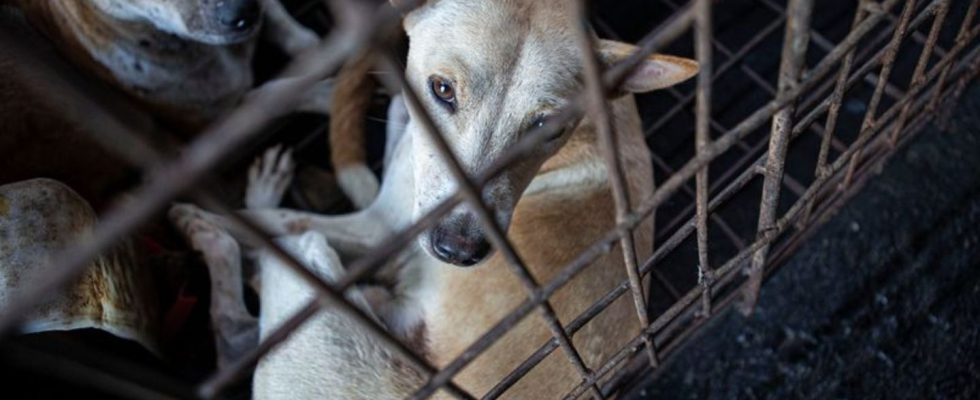In Indonesia, dogs first suffer terribly in barbaric markets and then end up in the cooking pot. A market has now been banned from selling dog and cat meat. But the tradition is still alive.
The town of Tomohon on the Indonesian island of Sulawesi is known for its picturesque, volcanic surroundings – and a wildlife market that sends shivers down the spines of most Western visitors.
Until recently, dogs and cats were offered for sale here as delicacies, alongside other animals such as bats, snakes, rats and monkeys. But that’s not all: the “Tomohon Extreme Market” made headlines primarily with its brutal slaughter methods.
Animals often have to suffer
The name “Extreme” said it all. Many travelers reported their experiences online in horror. The animals were brutally killed or hanged in front of customers and their fur was sometimes burned off alive with an open fire. For years, animal rights activists have documented the cruel practices and warned about the public health risks of consuming dog and cat meat.
“Dogs are not livestock. What if they are sick or have rabies? These animals are not food,” said Indira Tendi, an animal rights activist from Jakarta. Already in 2018, 90 celebrities, including Hollywood stars such as Cameron Diaz and Pierce Brosnan as well as talk icon Ellen DeGeneres, appealed to President Joko Widodo to end the barbaric practices.
The central government then issued an order calling on all governors and mayors to stop trade and consumption. But the carnage continued.
Tradition widespread
Now a ray of hope: In July 2023, the mayor of Tomohon issued a resolution banning the slaughter of dogs and cats and the sale of their meat – and brought the notorious market to a standstill virtually overnight. To date, around 20 other cities have also passed policies or regulations banning the trade in the animals for human consumption.
However, this is still widespread in the huge island empire. It is primarily Christian ethnic groups that maintain the tradition, such as the Minahasa in North Sulawesi and the Batak in Sumatra. They say that meat has healing powers.
Many people simply like the taste and serve dogs and cats as culinary treats at weddings or funerals. However, many Muslim scholars in Indonesia – the country with the largest Islamic population in the world – see the consumption of the animals as a violation of religious dietary laws.
A business model
It is estimated that around a million dogs and hundreds of thousands of cats are slaughtered in Indonesia every year. Dogs also end up in the cooking pot in other Asian countries.
According to the animal protection organization Humane Society International (HSI), they are considered a culinary delight, especially in China, where between 10 and 20 million specimens are killed every year, but also in South Korea, the north of India, Cambodia and Vietnam, among others.
The trade is big business and involves catching, transporting, slaughtering and selling animals – often in unsanitary and illegal conditions. Adrian Hane, director of Dog Meat Free Indonesia – a coalition of animal rights groups – praised the ban in Tomohon:
“This is a clear message to the world that Indonesia will not tolerate the cruel and illegal trade in dog and cat meat, which poses a serious risk to public health due to possible zoonoses or rabies,” he told the German Press Agency. According to experts, consumption can also promote cholera outbreaks.
The animals are traded for prices between 50,000 and 100,000 Indonesian rupees (three to six euros) and then sold to markets and restaurants for many times that amount. According to Humane Society International, these are mostly street dogs, but many pets are also stolen. What awaits them is sheer horror.
waiting for death
HSI writes: “They are crammed so tightly together in cages and bags that they cannot move, with their mouths tied so that they can hardly breathe.” The dogs would then be taken to markets, slaughterhouses and restaurants in overcrowded trucks. The transport is often extremely long and painful for the animals.
“Many die from suffocation, dehydration or heat stroke before reaching their final destination,” the organization says. Those that survived would have to watch as their peers were brutally killed while they waited their turn. Your fear is unimaginable.
Ban saves animals
The authorities’ ban in Tomohon will save thousands of dogs and cats from this fate every month, says HSI employee Lola Webber. “It also sets an important precedent that other cities and even provinces could follow.”
In Indonesia, too, people are slowly realizing that dogs are domesticated animals that have been one of man’s most loyal friends and helpers for thousands of years. “They have unique personalities and emotions and can form strong bonds with their owners.” As part of the ban, HSI announced that it would take over all remaining dogs and cats from slaughterhouses around Tomohon and place them in animal shelters.
Dealers and consumers are not happy
On the “Extreme Market”, however, the joy is limited. “I stopped buying and selling dogs, although demand is still high,” said Melki Pongo, who had supplied the market with dogs and cats for three decades. He lost a major source of income.
Animal rights activist Adrian Hane is convinced that it will be difficult to enforce the guidelines that have already been issued in various parts of the country. Some retailers and consumers defied all orders.
In addition, the city of Solo in Central Java is still a hotspot for the dog trade. Hane called on the mayor there to also impose a ban – and quoted Mahatma Gandhi: “The greatness and moral progress of a nation can be measured by how it treats its animals.”

